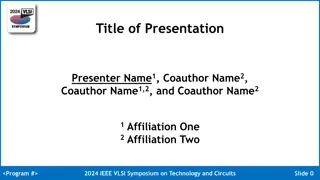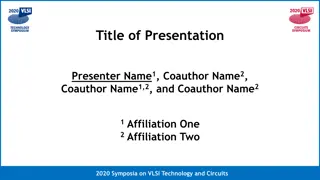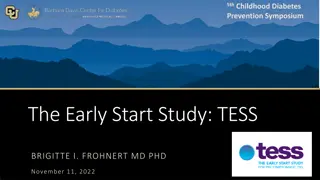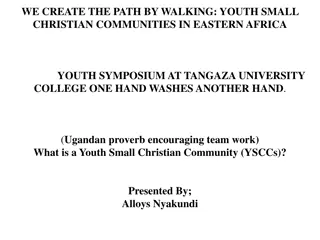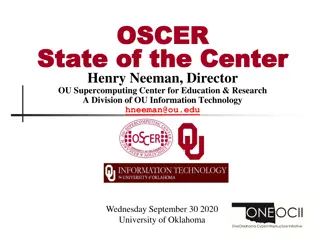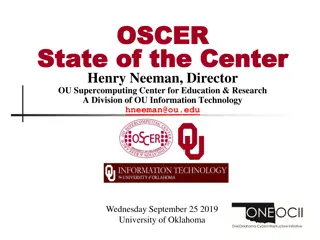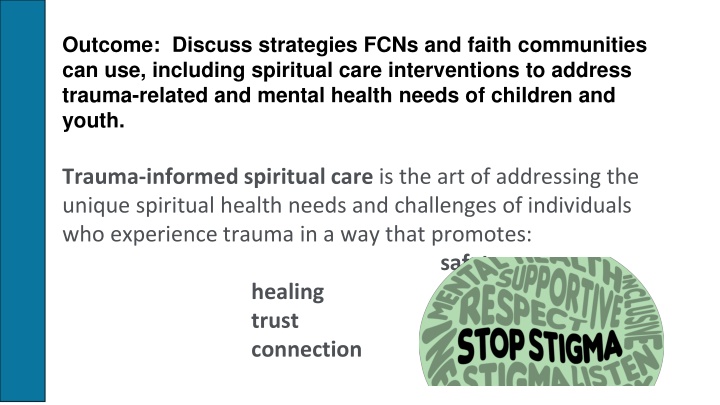
Strategies for Trauma-Informed Spiritual Care for Children and Youth
Explore effective strategies for faith communities and FCNs to provide trauma-informed spiritual care for children and youth, addressing their mental health needs. Learn about the importance of understanding stages of faith development, offering supportive interventions, and creating safe, inclusive environments.
Download Presentation

Please find below an Image/Link to download the presentation.
The content on the website is provided AS IS for your information and personal use only. It may not be sold, licensed, or shared on other websites without obtaining consent from the author. If you encounter any issues during the download, it is possible that the publisher has removed the file from their server.
You are allowed to download the files provided on this website for personal or commercial use, subject to the condition that they are used lawfully. All files are the property of their respective owners.
The content on the website is provided AS IS for your information and personal use only. It may not be sold, licensed, or shared on other websites without obtaining consent from the author.
E N D
Presentation Transcript
Outcome: Discuss strategies FCNs and faith communities can use, including spiritual care interventions to address trauma-related and mental health needs of children and youth. Trauma-informed spiritual care is the art of addressing the unique spiritual health needs and challenges of individuals who experience trauma in a way that promotes: safety healing trust connection
When were assessing spiritual needs and implementing spiritual care in trauma and mental health interventions for children and youth, we need to: Understand and keep in mind their stages of faith development. Meet them where they are without blaming, shaming or imposing unrealistic or unhelpful expectations. Remember that trauma and mental health issues may change the way persons see their supreme being. They may feel abandoned, angry or punished. They may question how a loving God could allow these things to happen.
A study of churches and trauma informed childrens ministries found: Exemplary ministries applied the values of preparation, awareness, collaboration, and transparency and sought to make children and adults feel safe, regulated, connected, and valued. This is a safe place. We take care of each other. We re a family. God cares about all of us. God loves us no matter what. Authentic compassion Supporting emotions Inclusive, respectful of differences. Building trust Crosby RG 3rd, Smith EI, Gage J, Blanchette L. Trauma-Informed Children's Ministry: a Qualitative Descriptive Study. J Child Adolesc Trauma. 2021 Jan 6;14(4):493-505. doi: 10.1007/s40653-020-00334-w. PMID: 34824665; PMCID: PMC8586392.
Remember our very first session? SAMHSA s recommendations for trauma-informed care: How do we apply spiritual care using this concept?
Spiritual Care Interventions: Prayer that assures the child, youth and family of God s love and for God s comfort, help and guidance. Listening without judgment authentic presence. Demonstrating God s love if a child or youth sees us exemplifying God s love, they will be more likely to trust and believe that there is a loving God. Supporting their emotions; encouraging expression of emotions. Being authentic, gentle and transparent. Using music that the child or youth finds calming or inspiring.
Encouraging expression of emotions through play, art, creative activities. Promoting connections with other children, youth, families who may have experienced similar experiences or with the faith community family, in general. Promoting fun, laughter and diversion from their stressors. Affirming the child and youth focusing on their strengths. Scripture stories that are appropriate. Giving them the gift of TIME and ATTENTION! (What do kids want and need most of all?) Every child you encounter is a divine appointment. Wess Stafford
And now its your turn to discuss ideas and plans! In your packet of handouts you have one titled: Mental Health and Trauma in Children and Youth: What Faith Communities and You Can Do! On the handout there are several strategies and a case study. In your small group, read the case study and, using your own knowledge and some of the strategies listed, please identify your interventions as an FCN and/or faith community.
Case Study: Youth with Mental Health Issue A couple with an 11-year-old, Ella, and a 15-year-old, Sam, have been part of your faith community for several years, although their attendance has been less frequent since Covid. You were once Sam s Sunday School teacher and have had a positive relationship with him since then. As the FCN at this faith community, you have also cared for Sam s mother who has expressed concerns about her marriage. Sam s mother contacted you a week ago and said, I feel like we might be losing Sam. He is so sullen, hates school and refuses to go to youth activities at church anymore. He just wants to stay in his room most of the time. His dad just thinks it s normal teenage behavior, but I m worried about him. He used to be such a happy kid but since Covid he s changed. He won t tell me what s going on, but I know my son and I m worried about him. He said he d be willing to meet with you. And please don t tell Pastor I know he thinks mental illness is a sign of lack of faith. You contact Sam and he agrees to meet. He tells you he is very sad. He says, Since Covid, I lost a lot of my friends. I m not very athletic and I m not interested in drinking or using drugs like others in my class . My dad is so hard on me and he doesn t care that I m being bullied at school. I know he s disappointed I don t play football like he did. He thinks I should be tough and stand up for myself. I dread going to school every day and don t have any friends. I m such a loser. Sam says he s afraid to tell his mom or dad because his dad has said, I m so tired of hearing about all these kids who are depressed. They don t know how good they have it these days! What are some strategies you would use in this situation? How well is your faith community equipped to help children and youth who ve experienced trauma or mental health issues?

